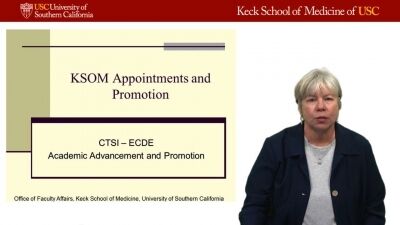Researchers and faculty learn here about the various requirements and procedures used to evaluate candidates for promotion and career advancement as a clinical and translational researcher at Keck School of Medicine of USC. A lecturer reviews specifics of criteria for tenure and non-tenure track scholars, and for various academic tracks, and discusses the procedures regarding professionals in three main areas: research/scholarship, teaching, and service/clinical activities. The lecturer explains how departmental, school and university evaluators assess candidates' job and career performance, such as "excellence in research," and what constitutes such excellence or strength within the different professional areas. The procedures relevant to special university-level designations, such as Clinical Scholar, are discussed. Also covered are development of effective candidate dossier contents, tips for writing personal statements, and mentor/mentee responsibilities.
Appointments and Promotions
A vice dean for faculty affairs explains the criteria and procedures used in evaluating clinical and translational researchers for academic advancement and promotion.
Career Development
Judy Garner, PhD
Vice Dean for Faculty Affairs, Keck School of Medicine at USC, Associate Professor in the Department of Cell and Neurobiology
Course Syllabus/Topics
- Tracks and their Promotion Criteria
- Tenure, Clinical, and Research Track, Special Designations
- Evaluating Research Scholarship
- Effectiveness and Contributions in Teaching and Lecturing
- Evaluating Excellence in Clinical Education
- Process for Dossier Reviews
- Individual Responsibilities: Faculty, Department Chairs, Administrators
- Tips for Writing Effective Personal Statements
- Strategies and Responsibilities in Mentor/Mentee Relationships

